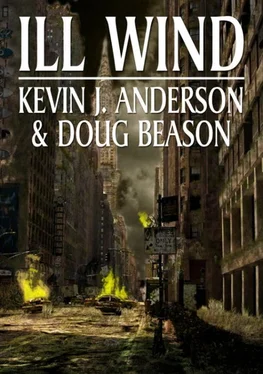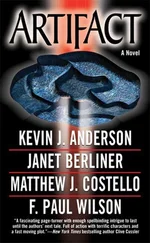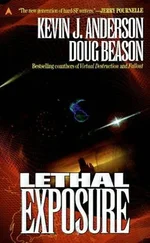A gnawing sensation grew at the pit of his stomach. On the phone Iris had told him she suspected something terribly wrong with the spread of Prometheus, but she wanted to talk to Alex before she raised any alarm. Why would Alex burn a pile of old notebooks, when he could just throw them away?
Unless he didn’t want anybody to find them.
“Alex?” Todd called again, then swallowed a lump in his throat. His stomach fluttered, then sank as he grew more certain he would not find the microbiologist. At least not alive.
He walked down the narrow hall to the bedrooms, past the bathroom which smelled mildewy from old soap and clean guest towels. The floorboards creaked under his cowboy boots as he continued to the back rooms. The bed in the master bedroom was made, but the bedspread rumpled and the pillow cocked sideways, as if Alex had lain on it for a while before getting up and going somewhere else.
On the nightstand, next to a clear glass half full of water, lay a bulky old Smith & Wesson double-action revolver. Todd recognized it as one of the older models, 1930 or 1940, but it had been recently cleaned. He could smell the cold, hard metallic aroma of the firearm.
Todd went cautiously to the bedside and picked up the weapon, wrapping his palm around the handle-grip. The Smith & Wesson felt slick, but Todd realized it was his own sweat. He sniffed the barrel, but smelled no acrid gunpowder that would tell him it had been fired recently. He couldn’t understand why Alex had taken the gun out, then left it lying around the house. Had he lost his nerve over something? Todd wet his lips.
When he turned back to the hall, Todd saw that the door to the other bedroom stood shut, as if closed against prying eyes. Todd gripped the cold doorknob and hesitated.
“Alex? Are you in there?” he said, then knocked lightly.
After a moment of silence, Todd took a deep breath, then pushed the door open slowly, expecting it to creak, afraid something might jump out at him.
The miniblinds had been drawn, leaving the muffled room awash in watery gray light. Before Todd’s eyes could adjust, he smelled a dry, sour smell of wrongness, the lingering pit-of-the-stomach twist of death, the stench of dried flesh.
Alex sat on a padded kitchen chair in the middle of the room, slumped and motionless, as if gravity had slowly sagged him.
“Alex!” Todd said, then snapped out of his sluggish shock. He slapped the wall twice before he found the light switch. Sharp yellow illumination sent the shadows and murkiness fleeing. “Awww, jeez, Alex!”
Todd took two steps forward and stopped. Alex Kramer rested in a rubbery position, as if his joints had turned liquid for a moment, then frozen into place with rigor mortis. His skin had the grayish, mottled appearance of someone who had been dead for a day or so.
His head had cocked forward on his neck, resting his chin and his neat peppery-gray beard against the base of his throat. His eyes were squeezed shut, surrounded with the cobwebs of wrinkles.
He wore comfortable clothes, faded jeans, a work shirt, no shoes and grayish-white socks. In his lap he clutched his eyeglasses folded in one hand. The other hand gripped a picture frame, turned face down against his jeans.
Todd stepped forward, clumsy like an intruder, but driven. He reached out for the picture frame, but then the pointed toe of his boot kicked something that rattled hollowly on the floor under the chair.
He bent over and picked up three dark-orange prescription pill bottles. Todd didn’t recognize the names of the drugs, but they sounded like high-strength pain killers. Under a strip of bright cellophane tape, the date on one prescription label had expired five years before.
The pieces fell into place, rattling like bones in an empty cup. Todd pictured Alex taking out the revolver in the master bedroom, lying restless on the bed, agonizing over his decision to kill himself, and then eventually choosing another way, a method that was not so violent. But ultimately just as effective.
Todd stood on creaking knees, blinked his stinging eyes several times, and touched the picture frame in Alex’s lap. He lifted, then pried the photograph free of the dead man’s grip. It showed a handsome woman, classy-looking, with short hair and subtle, careful makeup. She wore a secret smile that seemed to slide right past Todd, as if she had directed it at someone else.
“Why the heck did you have to do this, Alex?” Todd whispered, squeezing the brim of his cowboy hat in his left hand. “Nothing could have been that bad.”
On the walls in the memorial bedroom, the other photographs, certificates, documents, seemed to hum with background noise, ghosts and memories, frozen moments that Alex had trapped in this room and had refused to set free. And now he had burned all his notes on Prometheus, then gone to join his family.
Todd stood up, his head spinning but his body unable to move. Finally, with one last glance at Alex, he went to find a phone so he could call the police, Oilstar, and Iris Shikozu.
Iris Shikozu felt like she was stuck on the Titanic , knowing it was doomed to sink but unable to do anything.
Aside from the muted chugging of the vacuum pumps and the air conditioner in her lab, she heard no students out in the hall, no clicking of shoes as people walked by, not even the distant sound of a professor droning on in a lecture room. She hadn’t even bothered to turn on the stereo not since Todd had told her that he was going to Alex Kramer’s house. She wished he would call, if for no other reason than to confirm what she had uncovered about Prometheus and the transportation breakdowns.
Genetic assays had proved that Prometheus was destroying gasoline as well as devouring the Zoroaster spill. And the actual microbe Alex Kramer had provided for the spraying operations was very different from the innocuous control sample he had given Iris for initial testing and verification.
Through Francis Plerry at Environmental Policy and Inspection, Iris had urged a drastic crackdown on gasoline sales and transportation beyond the Bay Area, at least until they could determine the spread of the Prometheus organism. But the governor had refused to take an action that might cause a panic.
Iris spread the word anyway, hoping someone would refute her results; but every one of her colleagues came up with the same answer. Several of the other researchers immediately saw the implications, and everyone started making phone calls.
Random samples of gasoline were infected with Prometheus hybrids. Unexplained breakdowns were reported across the state, and the contamination was spreading exponentially from gas tank to gas tank, filling station to filling station. On the news last night, Iris had seen a story about rashes of mechanical failures popping up in Chicago, Denver, and Dallas. It was a plague, plain and simple. A petroleum plague .
In a fit of panic, she went to the small lab sink next to the coffee pot and scrubbed her hands three times with a bar of harsh pumice soap. If this microbe metabolized octane so voraciously, it might eat the shorter-chain hydrocarbons in her own body. She looked over the instruments she had touched. The organism might start breaking down other polymers.
She grabbed her old styrofoam cup and poured herself more steaming coffee, sipping it black as she fought to keep her hands from trembling.
The phone shrilled at her. Nearly spilling her coffee, she wove her way around the cluttered equipment and grabbed the phone on the third ring, breathless. “Hello?”
“Iris, this is Todd.” He sounded too serious.
“Can I talk to Dr. Kramer? This is really important!”
“He’s dead.”
“Dead?” She stopped, unsure of what to say. “How can he just drop dead and leave us with this mess?” Iris set her small mouth, then sat down in a creaking old office chair behind her desk. She knocked papers aside to clear a spot to rest her elbow. “Todd, you have no idea how serious this is! Kramer did something to his Prometheus—”
Читать дальше












